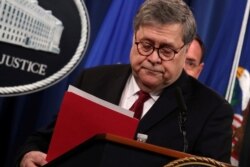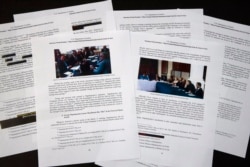When Robert Mueller takes the witness stand before members of Congress next month, millions of Americans are certain to tune in to watch the former special counsel field lawmakers' questions about the findings of his investigation of Russian meddling in the 2016 U.S. presidential election.
The testimony promises to showcase the same rabid partisanship that has marked congressional hearings into the politically divisive inquiry over the past two years.
House Democrats will press Mueller to go further in explaining why he declined to reach a definitive decision in his report released April 18 on whether U.S. President Donald Trump had obstructed the special counsel's 22-month-long inquiry. And they will grill him on whether he disagreed with Attorney General William Barr's subsequent finding that Trump could not be charged with the crime of obstruction of justice.
Republicans, meanwhile, will do their best to discredit the Mueller probe and demand an explanation for the genesis of the investigation and whether the former special counsel and some of his investigators were biased toward Trump. The president has repeatedly derided Mueller's investigation as a "hoax" and on Wednesday alleged without evidence that Mueller had committed a crime by deleting text messages of two anti-Trump FBI employees who had worked on the investigation.
'The report is my testimony'
But if Democratic and Republican lawmakers hope to score political points by trying to get Mueller to go off-script, they'll likely be disappointed. Former federal prosecutors and others who know Mueller say the button-down, straight-arrow former FBI director will likely closely hew to the findings of his 448-page final report to Barr and offer little else.
"He's already made it clear that he's going to limit his testimony to what's in his report so if you've read his report, you've heard his testimony," said Paul Rosenzweig, a former federal prosecutor who is now a senior legal fellow at the R Street Institute.
Hans von Spakovsky, another former federal prosecutor, said Mueller is a "chain of command kind of guy," a duty-bound official who would not publicly disagree with his boss. Mueller's laconic style could lead frustrated lawmakers to launch another partisan fistfight over the Russia investigation.
"I think what you're going to see is a lot more speeches by members of the committee than actual questions, the reason being that I don't think they're going to get out of Mueller anything more than what is already in the report," said von Spakovsky, who is now a senior legal fellow with the conservative Heritage Foundation.
In his report, Mueller concluded that there was no evidence that the Trump campaign had conspired with Russia to change the outcome of the 2016 election. However, the special counsel left undetermined the question of whether the president had criminally impeded his investigation.
Calls for Mueller to appear before Congress started almost from the moment his redacted report was publicly released. During a brief news conference late last month, Mueller stressed his reluctance to appear before congressional committees. He finally agreed to testify before the House intelligence and judiciary committees on July 17 after House Democrats issued a subpoena for his testimony. But Mueller has made clear that he would not deviate from his final report.
"The report is my testimony," Mueller said pithily during his Justice Department remarks on May 29.
Value of testimony
The statement suggests that Mueller, to the frustration of lawmakers, will likely repeatedly invoke his report -- by page and volume, if necessary — in response to questions about the facts of the investigation and his own legal analysis of the evidence. Still, lawmakers won't be deterred from pursuing other lines of questioning.
"I think some people say, 'Well, that may leave open the possibility to talk about process or he'll talk about his reasoning for some of his central legal determination that he would not charge the president,'" said William Yeomans, a former Justice Department official and chief counsel for the Senate Judiciary Committee.
But even if Mueller sticks to his report, there is value in his public testimony, said M. Tia Johnson, a visiting professor of law at Georgetown University.
"If he does nothing more than just almost read from his report, that's significant and powerful unto itself because that will air information that most Americans will not have heard because most Americans have not read that 448-page report," Johnson said.
Democratic House Speaker Nancy Pelosi has tamped down calls among many liberal members of her party for Trump's impeachment, saying there is not enough public appetite for such dire action. But whether Mueller's testimony will help shift public sentiment remains to be seen.
"To the extent that a foundation has to be lain before you can go driving towards impeachment, this further builds the case in support for that — or not," said Johnson, a former Obama administration official. "You have to establish the underlying facts for any type of Articles of Impeachment and what people forget is that even in the Watergate context, the Watergate hearings were doing just that."






